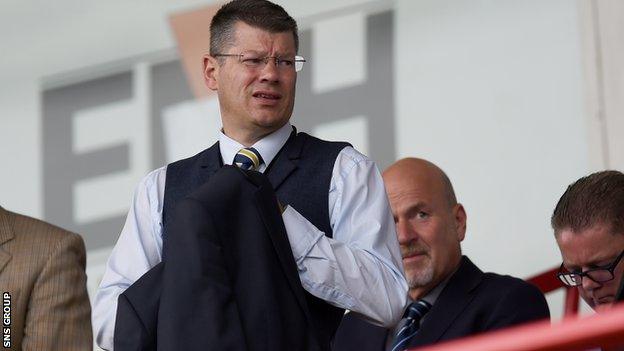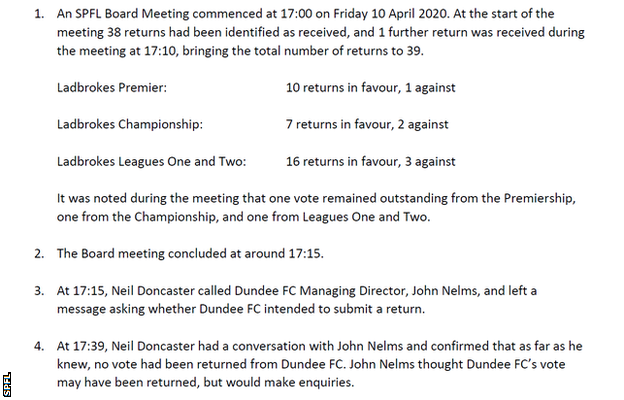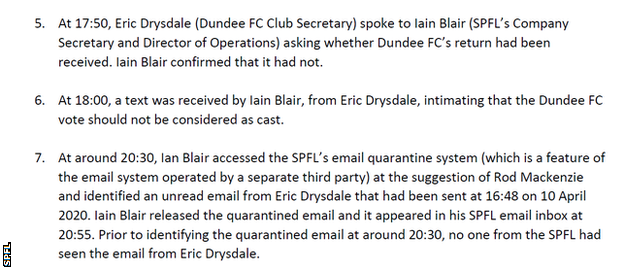Dundee vote: SPFL-commissioned investigation finds 'no evidence of impropriety'
- Published

Rangers called for the suspension of SPFL chief executive Neil Doncaster (above) and legal advisor Rod Mackenzie
The SPFL says an inquiry it ordered into Dundee's vote on the resolution to end the lower leagues has found "no evidence of improper behaviour".
Dundee had submitted a no vote which the league initially said was never received, before changing to a yes.
That switch proved decisive and the lower leagues were finished early.
Scottish Premiership clubs Rangers, Hearts and Aberdeen want an investigation into the whole process, not just Dundee's vote.
"Deloitte's examination of phone records, mobile communications (including texts) and email data has identified no evidence of improper behaviour by SPFL personnel concerning the submission of the Dundee FC vote," the SPFL's independent non-executive director Karyn McCluskey wrote in a letter to clubs.
"I hope that Scottish football will now focus on the significant issues that face our game, otherwise many clubs may not survive this period."
Three top-flight clubs have told BBC Scotland that they knew nothing about the inquiry and were not told in advance it would be published.
Rangers were the first to call for an independent investigation after claiming they had evidence from a "whistleblower" of a lack of "fair play" as well as "bullying and coercion" of clubs to vote in favour of the proposals.
The Ibrox side called for the suspension of SPFL chief executive Neil Doncaster and legal advisor Rod Mackenzie.
Hearts echoed the demand for an inquiry, with owner Ann Budge saying the league tried to "unduly influence" the outcome of the plans, and Aberdeen chairman Dave Cormack said a probe was required to restore fans' faith in the process.
The inquiry commissioned by the SPFL and carried out by auditors Deloitte looked at "the factual chronology relating to Dundee FC's return".
The resolution was backed by over 80% of Scotland's 42 senior clubs and gives the SPFL board the authority to prematurely end the Premiership.
The league's letter to clubs added the inquiry by Deloitte was ordered "to ensure complete probity and independence during this process".
What happened with the voting?
After the SPFL released the results of the poll shortly after the 17:00 BST deadline on Friday, 10 April, it emerged three clubs were yet to vote.
The most significant was Championship side Dundee, because the league had already garnered enough votes from the Premiership, League One and League Two to pass the plans.
BBC Scotland was then given a photograph of a voting slip signed by Dundee's managing director, John Nelms, which signalled they were going to vote no, and other clubs confirmed Dundee had told them that was their intention.
Inverness Caledonian Thistle chief executive Scot Gardiner then revealed Dundee secretary Eric Drysdale had intimated via WhatsApp that the Dens Park club had sent in their 'no' ballot.
But the league said it never arrived, and that instead it had received a message from Dundee saying their vote should not be considered as cast.
Five days later, Dundee backed the league's plans, which allowed the lower leagues to be called. You can read a full breakdown of events here.
'We only have more questions' - analysis
BBC Scotland's chief sportswriter Tom English
Despite trumpeting its "comprehensive", "independent" and "forensic" investigation, the SPFL has left itself wide open to criticism, which may now come in waves. This has been a farrago with many layers, the controversy surrounding Dundee's no vote, which became a cancelled vote, which became a yes vote being just one of them.
The SPFL investigation has not answered any of the important questions around the Dundee voting affair. Why did they change their vote and go with the SPFL resolution? Who did they speak to before changing it? Were they put under any pressure to change it? If this investigation was forensic then we would have answers. We only have more questions.
The other layers to all of this are to do with the clubs suggesting that they were put under undue pressure to vote yes. Rangers have mentioned bullying. No other club has gone that far, but Hearts, Aberdeen and Falkirk have joined the Ibrox side in calling for a fully independent inquiry to look at all corners of this debacle, and there are other clubs that say they will reveal details of being leaned on to vote yes if they are asked to by an independent examiner. The SPFL wants that stuff to go away.
None of what these clubs have read in this missive from Hampden is likely to sate their desire for further examination of the SPFL's behaviour. It is needed now more than ever.
What did the investigation find? - the letter

The SPFL laid out what the investigation found via a seven-point timeline in a letter
